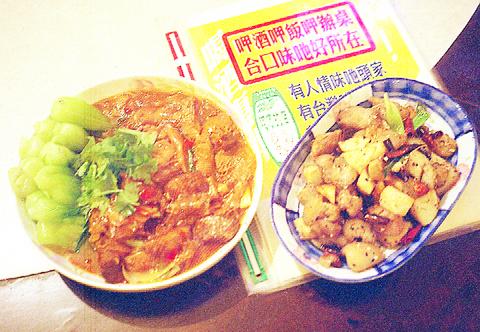Behind the glitzy BMW motorbike showroom at the junction of Jenai and Chinshan South roads sits a rare slice of old Taipei. Situated in what was once a domestic residence, Ah Tsai's (
Filled with old tables and shelves piled high with an extraordinarily assortment of household goods and with its walls bedecked with posters and kitsch art dating from the 1950s, there's no modern swankiness about Ah Tsai's. Instead it looks more like the home of some eccentric hoarder than a restaurant.
According to owner Ah Hua (

PHOTO: GAVIN PHIPPS, TAIPEI TIMES
The food is equally as unpretentious. There are two distinct trends in Ah Tsai's food -- spicy hot and meaty rich. Dishes such as Ah Tsai's special tofu (
Being a Taiwanese restaurant every usable part of every animal appears somewhere on the menu and means carnivores will be in their element. The numerous beef and pork dishes range in price from NT$180 to NT$300, and the mouth-watering beef tendon with vegetables (NT$220) is highly recommended. For those looking for something a bit different, then Ah Tsai's wild boar (
While there is no English menu, the sight of foreigners staring forlornly at the menu is something the staff have become used to over the years and are always more than willing to help out.
An added bonus is the chance to drink a glass, or two, with the establishment's jovial owner. Ah Hua can be spotted coming a mile away, usually toting a bottle of Taiwan Beer. He will, without invitation, take a seat and raise a glass to the table's occupants.

This month the government ordered a one-year block of Xiaohongshu (小紅書) or Rednote, a Chinese social media platform with more than 3 million users in Taiwan. The government pointed to widespread fraud activity on the platform, along with cybersecurity failures. Officials said that they had reached out to the company and asked it to change. However, they received no response. The pro-China parties, the Chinese Nationalist Party (KMT) and Taiwan People’s Party (TPP), immediately swung into action, denouncing the ban as an attack on free speech. This “free speech” claim was then echoed by the People’s Republic of China (PRC),

Exceptions to the rule are sometimes revealing. For a brief few years, there was an emerging ideological split between the Democratic Progressive Party (DPP) and Chinese Nationalist Party (KMT) that appeared to be pushing the DPP in a direction that would be considered more liberal, and the KMT more conservative. In the previous column, “The KMT-DPP’s bureaucrat-led developmental state” (Dec. 11, page 12), we examined how Taiwan’s democratic system developed, and how both the two main parties largely accepted a similar consensus on how Taiwan should be run domestically and did not split along the left-right lines more familiar in

As I finally slid into the warm embrace of the hot, clifftop pool, it was a serene moment of reflection. The sound of the river reflected off the cave walls, the white of our camping lights reflected off the dark, shimmering surface of the water, and I reflected on how fortunate I was to be here. After all, the beautiful walk through narrow canyons that had brought us here had been inaccessible for five years — and will be again soon. The day had started at the Huisun Forest Area (惠蓀林場), at the end of Nantou County Route 80, north and east

Specialty sandwiches loaded with the contents of an entire charcuterie board, overflowing with sauces, creams and all manner of creative add-ons, is perhaps one of the biggest global food trends of this year. From London to New York, lines form down the block for mortadella, burrata, pistachio and more stuffed between slices of fresh sourdough, rye or focaccia. To try the trend in Taipei, Munchies Mafia is for sure the spot — could this be the best sandwich in town? Carlos from Spain and Sergio from Mexico opened this spot just seven months ago. The two met working in the